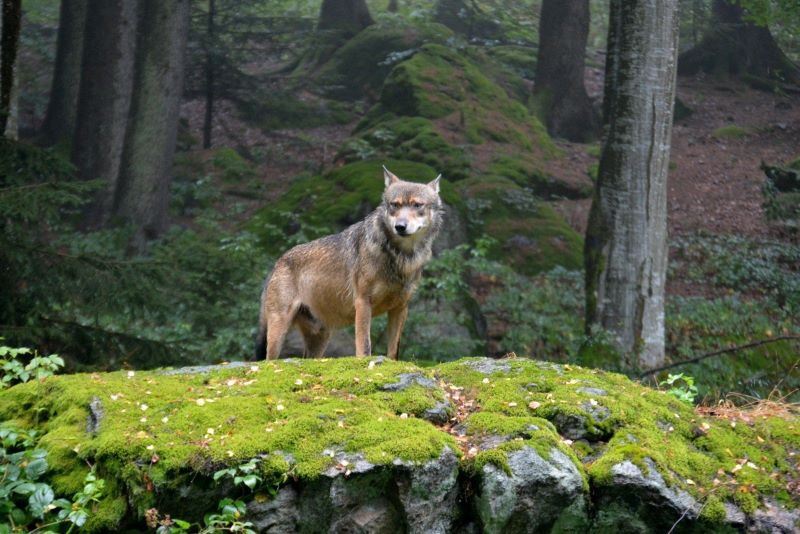Large carnivores, such as bears, lynxes and wolves, should remain strictly protected within the EU, and have a right to co-exist with humans, according to a survey published on Thursday.
The survey was commissioned by Eurogroup for Animals and other animal welfare NGOs and was conducted in November 2023 in 10 EU member states (Germany, France, Spain, Netherlands, Italy, Belgium, Poland, Denmark, Sweden and Romania).
It aimed to explore the attitudes and perceptions among a sample of 1000 people in each country, living in rural communities, towards large carnivores and hunting practices. People in rural areas might be more exposed to wild animals and therefore afraid of them but the findings defied stereotypes.
Only 32% of respondents stated that the presence of large carnivores in their area makes them feel unsafe and an additional 27% have no opinion, indicating that this is not a major concern. 62% would feel safer if they understood how wolves and bears behave and how to scare them off in the event of an encounter. More respondents (44%) indicated feeling unsafe going out during hunting season.
Wildlife management is often influenced by hunting and farming interest groups. The survey results reveal that rural communities generally do not feel represented by such interest groups. Only 18% of respondents feel appropriately represented by farming interest groups and this number goes down to 12% for hunting interest groups.
A large majority of the respondents (66 %) said that decision-makers, including EU institutions, should prioritise the conservation of large carnivores, with 65% saying that the killing of individual problematic large carnivores should only take place if it can be proved that adequate protection measures have been implemented and failed.
The survey identified environmental protection for future generations (80%) and conservation of biodiversity (78%) as important priorities for the EU.
The responses from Belgian participants generally align with average responses showing a strong support for the protection of large carnivores. It stands among the most supportive member states towards the strict protection status of large carnivores (73%). A majority (75%) agree that large carnivores have the right to exist in EU.
Wolves at risk
As previously reported, wolves are currently at the risk of having their protection guaranteed in the Habitats directive downgraded. The European Commission announced in beginning of September a data collection on wolves in the EU to address the challenges for local communities related to what it claims to be a return of the wolves.
“The concentration of wolf packs in some European regions has become a real danger for livestock and potentially also for humans,” European Commission President von der Leyen said when the data collection was launched. Local communities, scientists and all interested parties were invited to submit up-to-date data by 22 September on wolf population and their impacts.
Asked about the status of the data collection at the Commission’s press conference on Friday, a spokesperson told The Brussels Times that the Commission had committed to the European Parliament to finalize a study on the issue of wolves by the end of this year. The study can lead to proposals for adjustments to the protection of wolves in the EU.
According to the spokesperson, the Commission received over 17,000 emails in response to its dedicated mailbox for the consultation. The Commission will also use scientific data and consult member states and relevant stakeholders via a special expert group. He did not mention if it also would take into account the new survey findings.
"The return of the wolves in Europe is a cause of celebration, not of fear,” commented Reineke Hameleers, CEO, Eurogroup for Animals. "Despite the narrative being presented by some, the results of this survey clearly highlight that the majority of those living in the proximity of wolves support their protection status and are willing to co-exist”.
The EU Habitats directive protects endangered species such as wolfs, bears and lynxes but Sweden continues to violate the directive by prioritizing the interests of the hunting community in the country. Misha Istratov, a Swedish wildlife ambassador, told The Brussels Times that a survey of the rural voices of Europe was long overdue.
“In Sweden, the hunting lobby has clinched the media’s attention in showcasing the relatively few wolf attacks instead of exploring the perspective of the many farmers that have installed fencing to protect farm animals and are now peacefully co-existing with wolves. Furthermore, most rural residents who are not involved in farm animals are happy to have large carnivores in their vicinities.”
The understanding of their great importance for biodiversity and controlling other populations in their role as apex predators is growing, he says. "A recent study from Slovakia showed once again that hunting and culling are ineffective methods for protecting farm animals. It is evident that more people are coming to the understanding that campaigning against wolves is a populistic tool."
M. Apelblat
The Brussels Times

